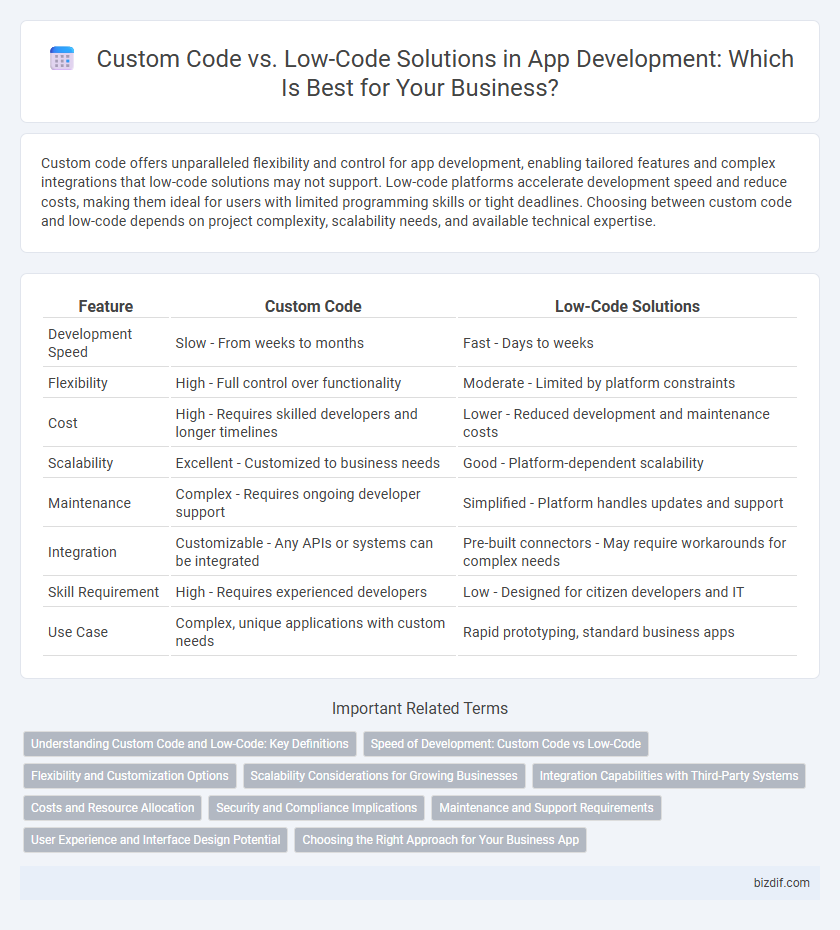Custom code offers unparalleled flexibility and control for app development, enabling tailored features and complex integrations that low-code solutions may not support. Low-code platforms accelerate development speed and reduce costs, making them ideal for users with limited programming skills or tight deadlines. Choosing between custom code and low-code depends on project complexity, scalability needs, and available technical expertise.
Table of Comparison
| Feature | Custom Code | Low-Code Solutions |
|---|---|---|
| Development Speed | Slow - From weeks to months | Fast - Days to weeks |
| Flexibility | High - Full control over functionality | Moderate - Limited by platform constraints |
| Cost | High - Requires skilled developers and longer timelines | Lower - Reduced development and maintenance costs |
| Scalability | Excellent - Customized to business needs | Good - Platform-dependent scalability |
| Maintenance | Complex - Requires ongoing developer support | Simplified - Platform handles updates and support |
| Integration | Customizable - Any APIs or systems can be integrated | Pre-built connectors - May require workarounds for complex needs |
| Skill Requirement | High - Requires experienced developers | Low - Designed for citizen developers and IT |
| Use Case | Complex, unique applications with custom needs | Rapid prototyping, standard business apps |
Understanding Custom Code and Low-Code: Key Definitions
Custom code refers to software developed from scratch using programming languages like Java, Python, or JavaScript, offering full control and flexibility to developers. Low-code solutions provide visual interfaces and pre-built modules that enable faster application development with minimal coding, suitable for business users and citizen developers. Understanding these definitions helps organizations choose between tailored, complex applications and faster, easier-to-deploy solutions based on project requirements and technical expertise.
Speed of Development: Custom Code vs Low-Code
Low-code solutions significantly accelerate development speed by using pre-built components and visual interfaces, enabling faster prototyping and deployment compared to custom code. Custom code requires extensive manual coding and debugging, which increases time to market but allows for greater flexibility and customization. Choosing between the two depends on project complexity, timeline, and resource availability.
Flexibility and Customization Options
Custom code development offers unparalleled flexibility and deep customization options, enabling developers to create tailored functionalities that precisely meet complex business requirements. Low-code solutions provide faster deployment through pre-built modules and drag-and-drop interfaces but often limit the scope for detailed customization and advanced feature integration. Choosing between custom code and low-code depends on project complexity, required scalability, and the need for personalized user experiences.
Scalability Considerations for Growing Businesses
Custom code offers unparalleled scalability, enabling growing businesses to tailor applications precisely to their evolving needs and handle increased user demands efficiently. Low-code solutions provide faster deployment and ease of use but may encounter limitations in performance and flexibility as business requirements become more complex. Evaluating long-term growth projections and technical complexity is crucial when choosing between custom development and low-code platforms for scalable app solutions.
Integration Capabilities with Third-Party Systems
Custom code offers superior integration capabilities with third-party systems, enabling developers to create tailored APIs and seamless data exchanges that meet specific business requirements. Low-code solutions provide pre-built connectors and drag-and-drop modules for faster integration but may lack flexibility when handling complex workflows or proprietary technologies. Enterprises seeking robust, scalable integration should evaluate the trade-offs between custom development's adaptability and low-code platforms' ease of use.
Costs and Resource Allocation
Custom code development demands higher initial costs and skilled developers, impacting budgets and staffing due to longer development cycles and complex maintenance. Low-code solutions significantly reduce expenses by enabling faster deployment with minimal coding expertise, optimizing resource allocation for iterative updates and scalability. Companies must balance upfront investments against long-term operational efficiency when choosing between these approaches.
Security and Compliance Implications
Custom code offers granular control over security protocols, enabling developers to implement tailored compliance measures that meet specific regulatory standards such as GDPR or HIPAA. Low-code solutions often provide built-in security features and automated compliance updates but may limit customization, potentially exposing vulnerabilities if default settings are insufficient. Assessing the security framework and compliance certifications of both approaches is critical for organizations handling sensitive data or operating in highly regulated industries.
Maintenance and Support Requirements
Custom code development demands specialized maintenance and support, often requiring skilled developers to manage updates, troubleshoot issues, and ensure scalability. Low-code solutions offer simplified maintenance through vendor-managed platforms with regular updates and built-in support, reducing the need for extensive technical expertise. Enterprises must weigh the long-term support commitments and resource availability when choosing between these development approaches.
User Experience and Interface Design Potential
Custom code enables developers to create highly tailored user experiences and intricate interface designs, offering full control over functionality and aesthetics. Low-code solutions provide faster development cycles with pre-built components, which can limit customization and nuanced interface detailing. Choosing between custom code and low-code platforms depends on the need for unique user interface elements and the desired level of design flexibility.
Choosing the Right Approach for Your Business App
Custom code offers complete flexibility and tailored functionality, ideal for complex business apps requiring unique features and scalable architecture. Low-code solutions accelerate development through pre-built components and drag-and-drop interfaces, optimizing time-to-market and reducing development costs for standard business workflows. Selecting the right approach depends on project complexity, budget constraints, and long-term scalability needs, ensuring the app aligns with strategic business goals.
Custom Code vs Low-Code Solutions Infographic

 bizdif.com
bizdif.com